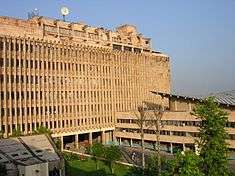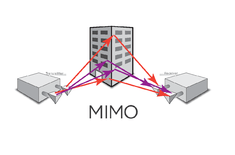Ranjan Mallik
| Ranjan Mallik | |
|---|---|
| Born |
15 November 1964 Kolkata, West Bengal, India |
| Residence | Delhi, India |
| Nationality | Indian |
| Alma mater | |
| Known for | Studies on multiple-input multi-output systems |
| Awards |
|
| Scientific career | |
| Fields | |
| Institutions | |
Ranjan Kumar Mallik (born 1967) is an Indian electrical and communications engineer and a professor at the Department of Electrical Engineering of the Indian Institute of Technology, Delhi.[1] He held the Jai Gupta chair at IIT Delhi from 2010 to 2012[2] and is the incumbent of the Brigadier Bhopinder Singh Chair.[3] He is known for his researches on multiple-input multi-output systems[4] and is an elected fellow of all the three major Indian science academies viz. Indian Academy of Sciences,[5] Indian National Science Academy[6] and National Academy of Sciences, India.[7] He is also an elected fellow of The World Academy of Sciences,[8] Indian National Academy of Engineering.[9] and Institute of Electrical and Electronics Engineers.[10] The Council of Scientific and Industrial Research, the apex agency of the Government of India for scientific research, awarded him the Shanti Swarup Bhatnagar Prize for Science and Technology, one of the highest Indian science awards for his contributions to Engineering Sciences in 2008.[11][note 1]
Biography

R. K. Mallik, born on 15 November 1964 in Kolkata, the capital city of the Indian state of West Bengal to Radharaman Mallik and Tapati, earned a BTech in electrical engineering from the Indian Institute of Technology, Kanpur in 1987.[12][13] His higher studies were at the University of Southern California from where he completed an MS in electrical engineering in 1988 and followed it up with a PhD in 1992.[1] Returning to India, he joined Defence Electronics Research Laboratory, Hyderabad the same year as a Grade C Scientist and worked there for two years till his move to the Indian Institute of Technology, Kharagpur in 1994 as a lecturer.[14] His stay at IIT Kharagpur lasted till 1996 during which period he served as an assistant professor during 1995–96. His next move was to the Indian Institute of Technology, Guwahati as an assistant professor and in 1998 he shifted his base to Delhi to join the Indian Institute of Technology, Delhi where he serves as a professor. In between, he held the IRDC Research Chair in Wireless Communications from 2009 to 2015 and the Jai Gupta chair from 2010 to 2012.[2] He holds the Brigadier Bhopinder Singh Chair since 2012[3] and is also associated with Bharti School of Telecommunication Technology and Management of IIT Delhi as a faculty.[15]
Mallik is married to Sumona Dasgupta and the couple has one child, Upamanyu. The family lives in Delhi.[7]
Legacy

Mallik's researches have been in the fields of Communication theory, Difference equations and Linear Algebra[16] and he has worked extensively on the performance analysis of multiple-input multi-output systems, especially characterization of fading channel statistics and error analysis under correlated fading conditions.[4] He has documented his researches by way of several articles;[17][note 2] Google Scholar and ResearchGate, online article repositories of scientific articles, have listed many of them.[18][19] Besides, he has contributed chapters to books including the 2011 edition of Issues in Telecommunications Research published by ScholarlyEditions.[20]
Mallik is a member of the Program Advisory Committee on Electrical, Electronics and Computer Engineering of the Science and Engineering Research Board of the Department of Science and Technology.[21] He is a former treasurer (2005 and 2006) of the Delhi chapter of the Institute of Electrical and Electronics Engineers[22] and is a member of its Awards Standing Committee since 2015.[23] He is a member of the executive committee of the Communication Systems and Network Association (COMSNETS)[24] and has contributed to the organizing of several seminars and conferences; Eighteenth National Conference on Communications NCC 2012 held at IIT Kharagpur in 2012[25][26] and the International Conference on Signal Processing and Communication 2013 organized by Jaypee Institute of Information Technology feature among them.[27] The invited or key note speeches delivered by him include the lecture on Performance Evaluation and Channel Characterization for Wireless Communication System at National Science day (2009),[28] the address on Optimal Signaling for Multi-Level Amplitude-Shift Keying with Single-Input Multiple-Output and Non-coherent Reception at CALCON (2014)[29] Alexander Graham Bell lecture of IEEE (2015),[30] and the keynote speech at IEEE Patna 5G Summit (2016).[31]
Awards and honors
Mallik became an elected fellow of the National Academy of Sciences, India in 2007.[32] He received the Hari Om Ashram Prerit Dr. Vikram Sarabhai Research Award in electronics, telematics, informatics, and automation of the Physical Research Laboratory in 2008[33] and the Council of Scientific and Industrial Research awarded him the Shanti Swarup Bhatnagar Prize, one of the highest Indian science awards the same year.[34] The Indian National Science Academy elected him as a fellow in 2011[35] and the Indian Academy of Sciences followed suit a year later.[5] The year 2012 brought him two elected fellowships; that of the World Academy of Sciences[36] and the Institute of Electrical and Electronics Engineers.[37] He is also an elected fellow of the Institution of Engineering and Technology[12] and the Indian National Academy of Engineering.[38]
Selected bibliography
- Mallik, R. K. (2006). "Optimized diversity combining with imperfect channel estimation". IEEE Transactions on Information Theory. 52 (3): 1176–1184. doi:10.1109/TIT.2005.864444.
- Mallik, R. K.; Zhang, Q. T. (2007). "A tight upper bound on the PEP of a space-time coded system". IEEE Transactions on Wireless Communications. 6 (9): 3238–3247. doi:10.1109/TWC.2007.051066.
- Mallik, R. K.; Winters, J. H. (2008). "Optimum receiver for a realistic transmit-receive diversity system in correlated fading". IEEE Transactions on Information Theory. 54 (12): 5456–5468. doi:10.1109/TIT.2008.2006444.
- Yi, Shi; Jiaheng, Wang; Letaief, K.; Mallik, R. (2009). "A game-theoretic approach for distributed power control in interference relay channels". IEEE Transactions on Wireless Communications,. 8 (6): 3151–3161. doi:10.1109/TWC.2009.080831.
- Sagias, N. C.; Mallik, R. K.; Tombras, G. S. (2010). "Error rate performance of multilevel signals with coherent detection". IEEE Transactions on Communications. 58 (8): 2188–2192. doi:10.1109/TCOMM.2010.08.090262.
See also
Notes
References
- 1 2 "Professor". IIT Delhi. 2017.
- 1 2 "Jai Gupta chair". IITD Archives. 2017.
- 1 2 "Brigadier Bhopinder Singh Chair". IITD Chairs. 2017.
- 1 2 "Brief Profile of the Awardee". Shanti Swarup Bhatnagar Prize. 2017.
- 1 2 "Fellow profile". Indian Academy of Sciences. 2016.
- ↑ "Indian fellow". Indian National Science Academy. 2016.
- 1 2 "NASI fellows". National Academy of Sciences, India. 2016.
- ↑ "TWAS fellow". The World Academy of Sciences. 2016.
- ↑ "INAE fellows". Indian National Academy of Engineers. 2016.
- ↑ "IEEE Fellows Directory". Institute of Electrical and Electronics Engineers. 2016.
- ↑ "View Bhatnagar Awardees". Shanti Swarup Bhatnagar Prize. 2016. Retrieved 12 November 2016.
- 1 2 "Getting ahead of the curve in wireless communications". International Development and Research Center. 2017.
- ↑ "Education". RK Mallik.com. 2017.
- ↑ "Work experience". RK Mallik.com. 2017.
- ↑ "Bharti School". Bharti School of Telecommunication Technology and Management. 2017.
- ↑ "Faculty List". IIT Council. 2017.
- ↑ "Browse by Fellow". Indian Academy of Sciences. 2016.
- ↑ "On Google Scholar". Google Scholar. 2016.
- ↑ "On ResearchGate". On ResearchGate. 2016.
- ↑ R. K. Mallik (chapter) (9 January 2012). "Deterministic Linear Combining Receivers for Random Fading Channels". Issues in Telecommunications Research: 2011 Edition. ScholarlyEditions. pp. 84–. ISBN 978-1-4649-6648-4.
- ↑ "Program Advisory Committee on Electrical, Electronics and Computer Engineering" (PDF). Science and Engineering Research Board. 2017.
- ↑ "History of IEEE Delhi Section". Institute of Electrical and Electronics Engineers. 2017.
- ↑ "Member of Awards Standing Committee". Institute of Electrical and Electronics Engineers. 2017.
- ↑ "List of executive committee members". Communication Systems and Network Association. 2017.
- ↑ http://ieeexplore.ieee.org/stamp/stamp.jsp?arnumber=6176735 (2017). "Steering Committee 1". Eighteenth National Conference on Communications NCC 2012. Missing or empty
|url=(help) - ↑ http://www.ncc.org.in/ncc2012/committee.html (2017). "Steering Committee 2". Eighteenth National Conference on Communications NCC 2012. Missing or empty
|url=(help) - ↑ "Oversight Committee (IEEE Delhi Section)" (PDF). Jaypee Institute of Information Technology. 2017.
- ↑ "Performance Evaluation and Channel Characterization for Wireless Communication System". Defence Research and Development Organization. 2009.
- ↑ "Calcon 2014" (PDF). IEEE. 2014.
- ↑ "Alexander Graham Bell lecture" (PDF). IEEE. 2015.
- ↑ "IEEE Patna 5G Summit". 5G Summit. 2017.
- ↑ "NASI Year Book 2015" (PDF). National Academy of Sciences, India. 2016.
- ↑ "PRL, Sarabhai awards announced". Times of Inda. 10 August 2008.
- ↑ "Engineering Sciences". Council of Scientific and Industrial Research. 2016. Archived from the original on 23 September 2015.
- ↑ "INSA Year Book 2016" (PDF). Indian National Science Academy. 2016.
- ↑ "TWAS elects 52 new members" (PDF). TWAS Newsletter. 2013. p. 16.
- ↑ "IEEE Fellows Elevated as of January 1, 2012". Institute of Electrical and Electronics Engineers. 2017.
- ↑ "INAE Fellows list". Indian National Academy of Engineering. 2017.
External links
- Ke-Lin Du; M. N. S. Swamy (15 April 2010). Wireless Communication Systems: From RF Subsystems to 4G Enabling Technologies. Cambridge University Press. pp. 155–. ISBN 978-1-139-48576-0.
- "Awards Committee" (PDF). IEEE Communications Society. 2015.
- "Electrical Engineering Department Major Examination Schedule" (PDF). List of Invigilators. IIT Delhi. 2014.